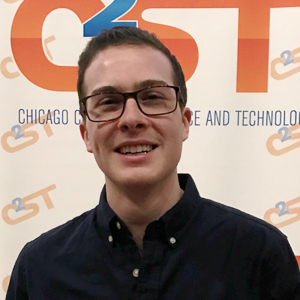Student Spotlight: James Schwabacher

By Irena Garic
Where are you from, and where did you go to school as an undergraduate?
I’m from Staten Island, NY—New York City’s forgotten borough—and obtained a B.S. in chemistry from American University in Washington, D.C.
How did you become interested in your research?
I am interested in (too) many things, but my quantum dot research allows me to study light-matter interactions, nanoscale structures, and chemical physics all at once.
Tell us about your involvement in the graduate student organizations?
I view my involvement in graduate student organizations as a way to help continually improve our department. I co-founded Chemistry Graduate Student Teachers (CGST) with Lee Robison to bring together members of our department interested in pedagogy and chemical education. As a member of the Graduate Liaison Committee (GLC), I work to increase collaboration and conversation between all student organization leaders, which amplifies our impact as co-creators of our department.
How would you explain what you study to non-scientists?
I study how tiny spheres, smaller than a fraction of the width of a single strand of human hair, behave as I move them from oil to water. My work will help us use them in living things. I want to give other scientists the ability to study how fast things happen within our bodies, which is not easily done at the moment.
What are some potential applications for the work that you’re doing?
A lack of water-soluble quantum dots with high stability and superior quality limits the field’s application in new technologies. While my work remains primarily fundamental, understanding the behavior of water-soluble quantum dots will improve aqueous photocatalytic systems and open up new avenues in biosensing.
What do you like to do outside of the lab?
I like to keep moving (usually by cycling or running). I devote some time to science engagement, communication, and education opportunities, like performing science-based stand-up comedy for adults with Science Riot. I am also experimenting with new cooking and baking techniques, where my failures are, at least, edible.
What is the best part about being in the Weiss Group?
I admire Emily’s ability to get to the core of a project or concept with one fundamental question. Young members of our group quickly learn how to answer such questions. Older group members, however, learn how to ask these questions, which is an invaluable skill that I continue to work towards.
